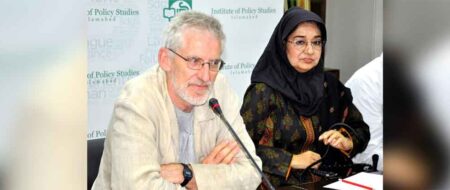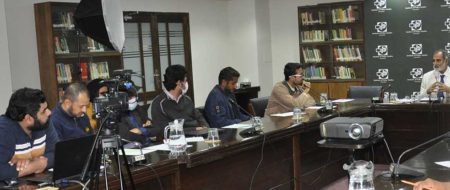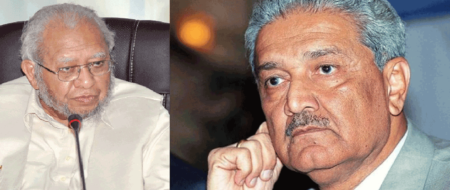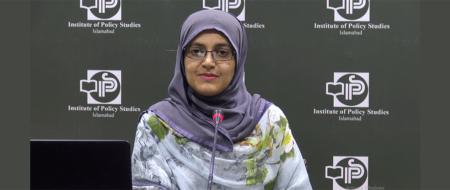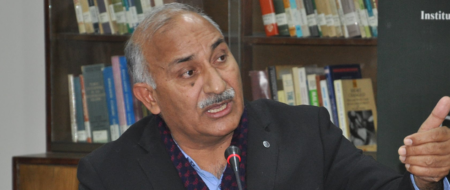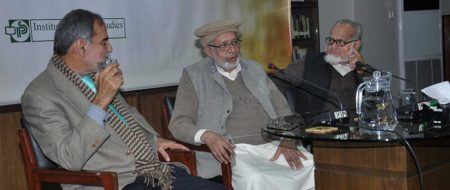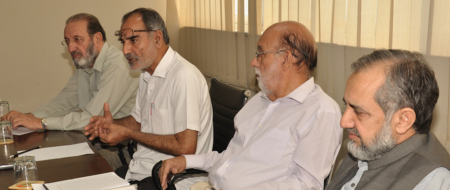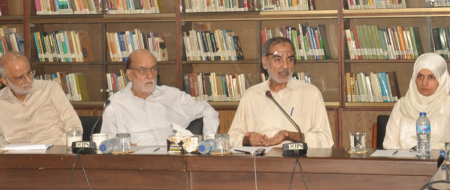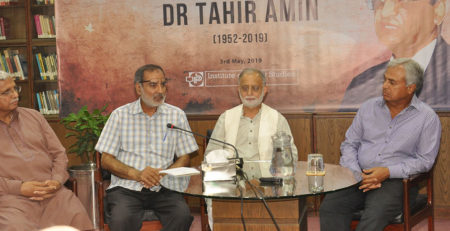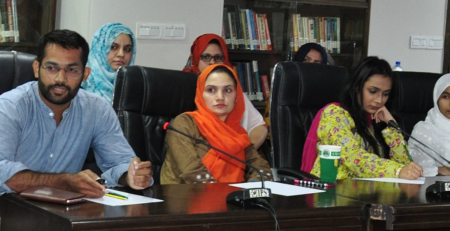IPS has undertaken themes relating women in society since its inception and a number of studies and publications followed in subsequent years. The subject later became a major focus in IPS when a Study Group on Gender Issues (SGGI) was established in 2001. The objective was to benefit from the knowledge, expertise and experiences of persons with different backgrounds and various fields of activity. The group prepared reports on institution of family, education and economy. For certain operational reasons, there was a break in proceedings of the Group for sometime.
Inaugural Session of SGGI
IPS has undertaken themes relating women in society since its inception and a number of studies and publications followed in subsequent years. The subject later became a major focus in IPS when a Study Group on Gender Issues (
SGGI) was established in 2001. The objective was to benefit from the knowledge, expertise and experiences of persons with different backgrounds and various fields of activity. The group prepared reports on institution of family, education and economy. For certain operational reasons, there was a break in proceedings of the Group for sometime.

The Institute has revived the Group (
SGGI) through a roundtable meeting which was attended by academicians, activists, lawyers, intellectuals and media professionals on March 19, 2009.
Opening the session, Director General IPS
Khalid Rahman said that gender issues had acquired a central position not only at the domestic but also at the international level, however, the debate had not shown any encouraging results because it revolved around the two extremes. He underlined that IPS wished to provide its platform to those who were objectively moderate and honestly interested in improving gender harmony in the country to strengthen the fabric of society and institution of family. Apprising the audience about the goal of this group, he said the group aimed at promoting a peaceful, balanced and healthy society in which the role of each member is clearly defined and respected. He emphasized the need to adopt a practical approach within the parameters of the indigenous value framework and with a true national perspective.
The meeting was next addressed by Dr. Naheed Ali, a former member of the National Commission on the Status of Women (NCSW), who orientated the participants with the plight of women in advanced countries where the institution of family has virtually shattered, leaving many individuals unattended and uncared for, adding that, “determining the role of women on the basis of her physical appearance, rather than her talent and her capabilities as a person, is the worst form of exploitation” she maintained.

Dr. Ali, while commenting on gender equality in the contemporary society, argued that a large proportion of women were confined to certain specific professions like nursing or teaching etc. Talking about the current status of the gender debate in Pakistan, she observed that the present discourse in the country lacked an indigenous complexion.
A healthy discussion among the members of the group was followed whereby they expressed their resolve to identify the real problems of Pakistani society and work for those who either do not know about their rights or are not able or willing to raise a voice for their early remedial.

The discussion also reflected difference of approaches towards certain specific issues. Some group members emphasized that men and women held equal importance but different roles and the spheres of their respective activity were at times not the same owing to the physical and psychological differences between them. However, others were of the view that the physical strength of men had been rendered irrelevant by the current technological advancement; rather, women were doing much better than men in many walks of life adding that a working woman works harder and sacrifice more to manage her dual responsibilities.
Concluding the session Dr. Naeem Mushtaq said that the theories and notions emerged as a result of certain theological and philosophical debates in a certain socity may not necessarily be accepted across the globe. He suggested that new literature focusing human rights, interfaith dialogue and gender debate should be developed to provide a better alternative to the prevalent theories in the world.
Dr. Mushtaq also recommended
SGG members to adopt the positive features of the current movements for human rights while remaining cautious of the undeclared programmes some movement are pursuing in various countries including Pakistan.
It was agreed that SGGI would meet every two months and its next meeting would be held in May 2009. The Sub-groups on economy, media and legislation would also be working and would prepare reports and policy guidelines for their respective areas. The meetings of these sub-groups are expected to be held in the month of April.
Thursday, March, 19 2009
 The Institute has revived the Group (SGGI) through a roundtable meeting which was attended by academicians, activists, lawyers, intellectuals and media professionals on March 19, 2009.
The Institute has revived the Group (SGGI) through a roundtable meeting which was attended by academicians, activists, lawyers, intellectuals and media professionals on March 19, 2009. Dr. Ali, while commenting on gender equality in the contemporary society, argued that a large proportion of women were confined to certain specific professions like nursing or teaching etc. Talking about the current status of the gender debate in Pakistan, she observed that the present discourse in the country lacked an indigenous complexion.
Dr. Ali, while commenting on gender equality in the contemporary society, argued that a large proportion of women were confined to certain specific professions like nursing or teaching etc. Talking about the current status of the gender debate in Pakistan, she observed that the present discourse in the country lacked an indigenous complexion. The discussion also reflected difference of approaches towards certain specific issues. Some group members emphasized that men and women held equal importance but different roles and the spheres of their respective activity were at times not the same owing to the physical and psychological differences between them. However, others were of the view that the physical strength of men had been rendered irrelevant by the current technological advancement; rather, women were doing much better than men in many walks of life adding that a working woman works harder and sacrifice more to manage her dual responsibilities.
The discussion also reflected difference of approaches towards certain specific issues. Some group members emphasized that men and women held equal importance but different roles and the spheres of their respective activity were at times not the same owing to the physical and psychological differences between them. However, others were of the view that the physical strength of men had been rendered irrelevant by the current technological advancement; rather, women were doing much better than men in many walks of life adding that a working woman works harder and sacrifice more to manage her dual responsibilities.





